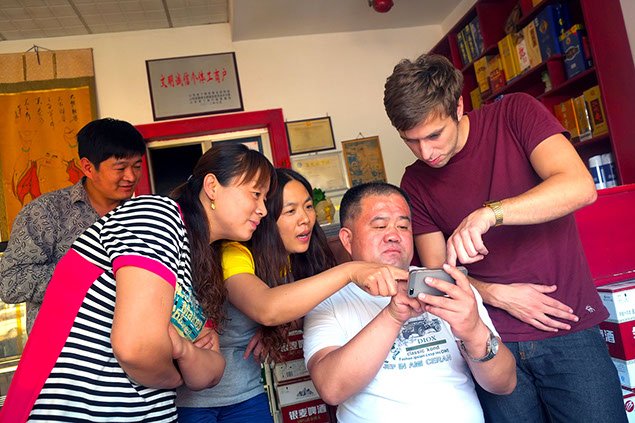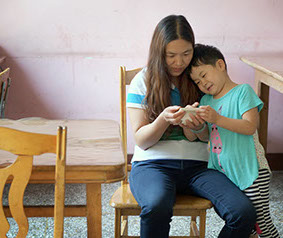
Dr Tom McDonald spent 15 months in a remote rural town of 6,000 people in Shandong province examining the impact social media was having on the lives of the inhabitants. His work was part of a much larger project launched by University College London (UCL) − ‘Why We Post‘ − an ambitious global anthropological research project on the effect of social media worldwide.
“It was the first ethnographic, comparative study of the use and consequences of social media around the world,” he explained. “We had nine anthropologists doing fieldwork in eight countries studying people’s relationship with social media – including Chinese factory workers, young Muslim women on the Syrian / Turkish border, IT professionals in India, and many more. The aim was to look at how average people use social media.” Other research studies was mainly concentrated on social media usage in the US.
‘Why We Post‘ was unique for all those involved, not least because anthropology tends to be a very solitary pursuit. “You’re cutting yourself off from your own life and spending extended amounts of time in a faraway community,” said Dr McDonald. “This time, while we were physically alone – we were all doing the same research, asking the same questions, at the same time. We skyped regularly, and shared our findings. It was very ethnographic but also very cooperative. That continued when I returned to London, and when I came to HKU in September, 2015.”

![]() When it comes to Mainland China and social media, many scholars from outside China focus on issues of the censorship and state control. But for my own participants, online censorship was less of a concern than many other more pressing issues regarding the internet.
When it comes to Mainland China and social media, many scholars from outside China focus on issues of the censorship and state control. But for my own participants, online censorship was less of a concern than many other more pressing issues regarding the internet. ![]()
Dr Tom McDonald
The main argument of his book is that rural Chinese internet users make use of social media to interact with not only friends, neighbours and colleagues, but also complete strangers. This is significant because traditional anthropological comprehension of Chinese societies has generally understood social relations to be organised around systems such as kinship, lineage or guanxi, all of which leave little room for strangers. However, his rural participants not only use social media to connect to strangers, but often form surprisingly intimate and trusting connections with them. “So, we have tried to understand what happens when rural people try to cope with the juxtaposition of these two relationships,” he said.
Prior to this study, there has been lots of research into internet use in China’s main cities, but very little on rural China, so the research gives a glimpse of what communication is in areas that few outsiders visit. “I was very lucky in that I did it at the perfect time because little had been written about how rural people use the internet,” said Dr McDonald. “Traditionally anthropology focusses on rituals, marriage ceremonies etc, within a society, but this study was about using social media as it is a great way to see people’s lives from a different angle. When it comes to Mainland China and social media, many scholars from outside China focus on issues of the censorship and state control. But for my own participants, online censorship was less of a concern than many other more pressing issues regarding the internet.
“We looked at what people post, how many have their own profile pages, how frequently they post – and as we got to know the people involved through living with them, we could understand the data within the context of their own lives. The most popular posts among rural Chinese users are young mums putting up pictures of their babies and romantic memes by teenagers. In both cases they are putting forward idealistic pictures of what perfect family life and love are meant to be.”
As he got to know people in the community better he could contrast this with what they said to him privately, on condition of anonymity. “Older, illiterate people told me they use the internet to play cards or mahjong online. Villagers would tell me their secrets. For example, a middle-aged pharmacist liked to talk to strangers online and often shared with them his dissatisfaction with aspects of his own life. It’s a release, he can’t say this to anyone in his home town as it’s a small local community and everyone would soon know. In this case, it is the contrast between the two pictures – the public idyll and the private dissatisfaction − that is interesting.”
There has been widespread interest in the findings. “UCL’s study was featured in The Economist, for example, and I was interviewed by the BBC World Service,” said Dr McDonald. “When my own book launched, I did a lecture tour in Hong Kong and China. It was interesting because I had started writing the book while still in London and so had approached it with non-Chinese readers in mind, but there has been much interest from Chinese. Their reactions have been mainly positive. They are most interested in how a foreigner views China.”
58,000 downloads
The ‘Why We Post‘ study is now nearing its end. “Books resulting from the study are all open access and published by UCL Press,” he explained. “Our main comparative volume,
How The World Changed Social Media, has had over 58,000 downloads [as of January, 2017] – which is crazy for an academic book!” His own solely authored book, Social Media in Rural China, which was launched at HKU in September, 2016, has had over 5,000 downloads, and he is now writing journal articles examining specific issues in more detail. The book was accompanied by an exhibition at the University, well attended by groups of students from local secondary schools.
The Social Mores of Social Media
Discussion rages daily about whether social media has in fact made us less social and more superficial. A global anthropological study has tried to dig deeper and find out how it has become woven into the fabric of our society, including that of rural Chinese communities.
Next
Back
The book launch was accompanied by an exhibition at the University and attracted groups of students from local secondary schools.
Research participants in the field site.
(Courtesy of Gillian Bolsover)
How The World Changed Social Media (left) is a publication resulting from the study and has recorded over 58,000 downloads (as of January, 2017). Social Media in Rural China (right), solely authored by Dr Tom McDonald, was launched at HKU in September, 2016, and has had over 5,000 downloads.
Young mums putting up pictures of their babies is one of the most popular posts among rural Chinese users.
(Courtesy of Gillian Bolsover)
Dr Tom McDonald (first from right) spent 15 months in a remote rural town in Shandong province to look into the impact of social media in China.
(Courtesy of Gillian Bolsover)






